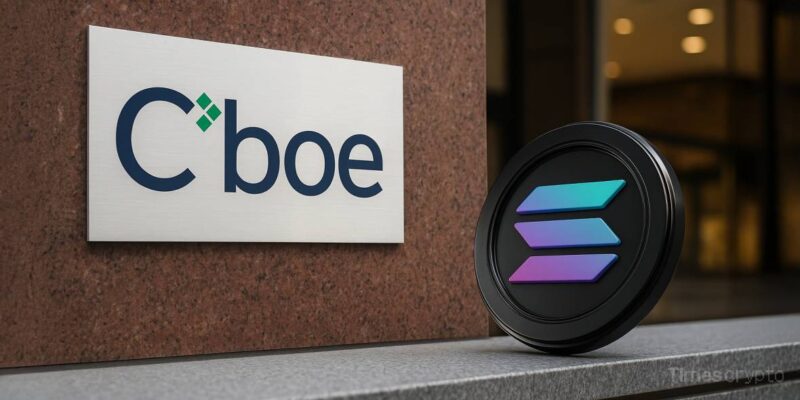
Key Takeaways
- Cboe Filed for Solana ETF: Cboe BZX Exchange has submitted a 19b-4 filing with the SEC to list the Invesco Galaxy Solana ETF, offering direct exposure to the cryptocurrency SOL.
- Regulatory Strategy Mirrors Bitcoin and Ether: Cboe is relying on the same regulatory logic the SEC used to approve spot Bitcoin and Ethereum ETFs, arguing that Solana’s market depth and volume reduce manipulation risks.
- Decision Timeline Could Stretch to 240 Days: The SEC could respond in as soon as 21 days, but the formal review process allows for a maximum window of 240 days.
- ETF Would Feature Staking and Yield: If approved, the ETF would directly hold SOL and include staking, potentially setting a new precedent for income-generating crypto investment products.
Cboe BZX Exchange has filed with U.S. regulators, under SEC filing number SR-CboeBZX-2025-098, to list and trade shares of the Invesco Galaxy Solana ETF, a new exchange-traded product designed to offer investors direct exposure to the cryptocurrency Solana (SOL).
Key Features of the New Spot Solana ETF
The proposed ETF, formally submitted as a regulatory filing with the SEC, would hold SOL directly and allow for a portion of the assets to be staked, generating yield. It also seeks to mirror the performance of the Lukka Prime Solana Reference Rate, a composite benchmark derived from prices across major trading platforms like Coinbase, Binance, and Kraken.
Unlike ETFs that hold futures contracts, this product would offer direct exposure to Solana’s spot price, potentially lowering costs and simplifying operations for investors.
The trust will allow both cash and in-kind creation and redemption of shares, which will be priced daily based on a net asset value (NAV) calculated at 4:00 p.m. Eastern Time, with an IIV every 15 seconds to track real-time market value during trading hours.

Compliance, Oversight, and SEC Strategy
Cboe is urging the SEC to approve the Solana ETF without requiring the usual agreement to share surveillance data with a large, regulated exchange that trades Solana.
This type of agreement has traditionally been a condition for spot crypto ETF approvals to help detect and prevent market manipulation.
Instead, Cboe is relying on the logic the SEC used to approve previous crypto ETFs, where alternative safeguards were accepted in place of surveillance-sharing agreements.
In line with this strategy, Cboe and Invesco Capital Management assert in their filing that the proposed trust adheres to the investor protection and anti-manipulation standards laid out in the Securities Exchange Act.
They further argue that Solana’s broad and active trading, with an average daily volume of $2 billion and a fully diluted market capitalization of $90 billion, helps shield it from price manipulation.

What’s the ETA on ETFs?
Bitcoin and Ethereum were the first cryptocurrencies to receive approval for spot ETFs trading in the U.S., following SEC decisions in January and May 2024, respectively.
These regulatory nods opened the door to broader institutional access, with products now listed by major firms including BlackRock, Fidelity, and Grayscale, which converted its Digital Large Cap Fund into a multi-asset ETF holding Bitcoin, Ethereum, Solana, XRP, and Cardano.
Following this momentum, a growing list of altcoins is now awaiting regulatory clearance.
Multiple issuers, including VanEck, Bitwise, and 21Shares, have filed for spot Solana and XRP ETFs, with final SEC decisions expected between late 2025 and early 2026.
Litecoin and Avalanche also have pending applications, though the SEC recently delayed its decision on Grayscale’s Avalanche ETF.
Applications for more speculative assets such as Dogecoin, Bonk, and even NFT-linked tokens like PENGU are also under review, though analysts suggest that they are less likely to win near-term approval.
Under current SEC procedures, Cboe’s submission falls under a 19b-4 rule change, which initiates a formal review period that can range from as early as 21 days to a maximum of 240 days.
However, the SEC’s recent approval of in-kind creation and redemption for Bitcoin and Ethereum ETFs has removed a key operational hurdle and could help streamline future approvals.
What Would Approval Mean for SOL
A regulatory green light for the new ETF could be a turning point for Solana.
Approval would likely open the gates to institutional capital, with analysts expecting strong inflows from asset managers and retail platforms looking for regulated ways to access the asset.
Beyond the potential for a price rally, being part of an ETF could help reduce volatility and improve liquidity, both of which would strengthen Solana’s standing as a leading cryptocurrency alongside Bitcoin and Ethereum.
Additionally, by including staking rewards in the fund’s design, the ETF could also pave the way for a new generation of income-producing crypto investments, drawing even more long-term interest in SOL.
Read More: Why is SHIBA INU’s Price Down Despite a 600M SHIB Burn?


